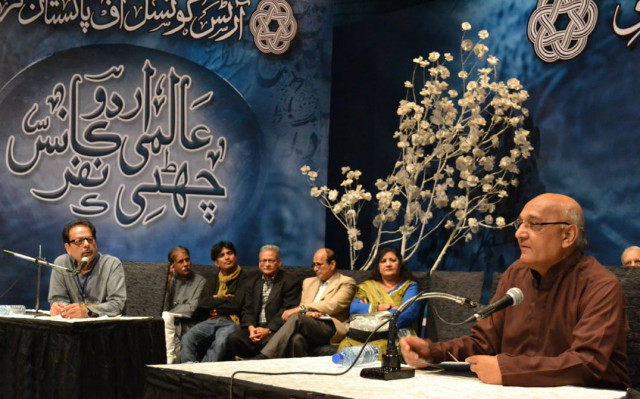6th International Urdu Conference: ‘Symbolic short stories were born out of game-changing events’
Fiction writers, critics and translators read their monographs on ‘Afsaana-aik sadi ka safar’.

Amjad Islam Amjad speaking at the 6th International Urdu Conference on Sunday. PHOTO: NNI
Noted fiction writers, critics and translators, reading out their monographs on ‘Afsaana-aik sadi ka safar’ [Short story: A century’ journey], pointed towards the decline of short story writing and publishing in Urdu literature.

“Fiction [reading] increases empathy and people have stopped caring and asking about others with the decline of short stories,” said writer and critic, Dr Asif Farrukhi. He fears that people will stop reading works of iconic fiction writer Saadat Hasan Manto just as they stopped reading Munshi Premchand, although he is still respected as a great writer.
“Short story writers of the 21st century have more challenges to face. On one hand, they are facing imperialism while on the other, they face the Taliban,” said writer and critic Akhlaq Ahmed in his speech. “There was a time when the enemy of your enemy was your friend but now he too is the enemy.” The writer of the 21st century is not only coping with the industrial revolution of the 20th century but also dealing with the technological revolution.
Translator Dr Mustafa Hussain shed light on translation of Danish fictions in Urdu, stressing that to translate fiction, one needs to have proper understanding of languages, culture, situation and life of the people relating to the languages. For the Islamabad-based fiction writer, Mohammad Hameed Shahid, the genre of fiction became a part of Urdu literature over a century.
Professor Ali Haider Malik, in his speech, said that the trend of symbolic short stories [alaamati afsana] will never end just as descriptive short stories will also continue to be written. Speaking on the history of symbolic short story writing in Urdu literature, he said that this trend evolved because of certain incidents across the globe which led writers to convey messages through symbolism, saying, “The time of Intizar Hussain and Envre Sajjad was the time of symbolic short stories.”
“Events such as the rule of Ziaul Haq, who was not popular among writers, nuclear tests in the subcontinent and the 9/11 attack in New York City affected Pakistan and a number of symbolic short stories of good quality were written in that period,” he said. He added that symbolic short stories should be recognised as a unique style and method of writing in Urdu literature.
Writer Zahida Hina spoke on important milestones of short stories in the 20th century. Writers Hasan Manzar, Masood Ashar, Asad Mohammad Khan and Intizar Hussain chaired the session.
Published in The Express Tribune, December 2nd, 2013.



















COMMENTS
Comments are moderated and generally will be posted if they are on-topic and not abusive.
For more information, please see our Comments FAQ